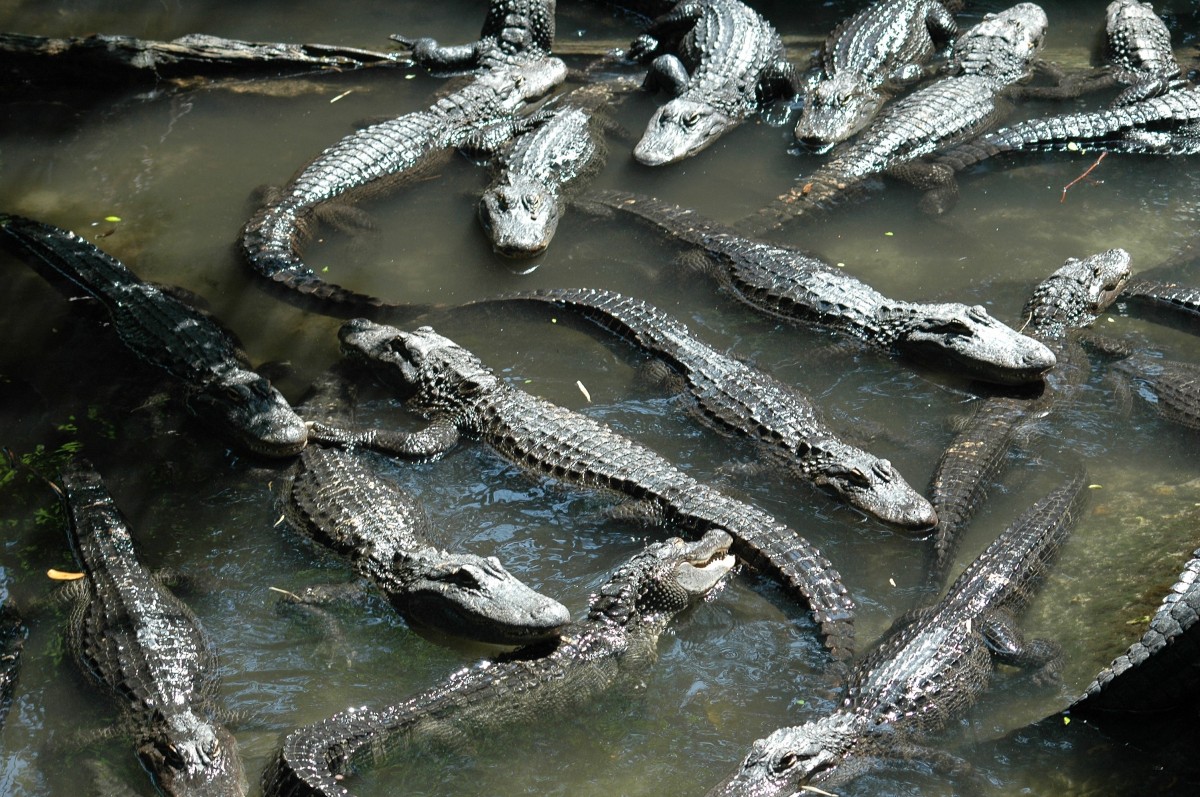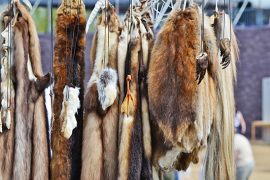Ryan Bradford
You can see it from the highway: a painted crocodile—fifty feet tall—beckons us into its mouth. The hot peal of desert wind makes the croc’s hanging saliva look refreshing, like we could hold our hands out and wait for it to drop.
“Borrego Crocodile Farm.” Cassie stretches, revealing a bellybutton jewel and damp armpits. She twists her shoe into the gravel lot. There are few other parked cars, but 18-wheelers blur past on the highway. “How much you wanna bet they’re fake,” she says. “The crocs.”
My thing with Cassie, it’s new. Met her on the app that all my friends told me to download after the divorce. They told me dating’s different now. Easier. I liked that.
Cassie takes my hand as we enter the crocodile’s mouth, her skin so soft it feels like it’s moisturizing mine. My knuckles graze the fringe hanging off her short shorts. It still feels strange, holding someone else’s hand. And Cassie is so young, just out of grad school with a degree in geology. That’s why we’re in the desert, the rocks.
You can learn so much about the world from rocks, Cassie had said during our last night in the tent. Our sleeping bags were zipped together and her breath smelled like whiskey. Or maybe it was my own, bouncing back out of her mouth. Drinking was the only thing I had successfully been able to do over the past two days. I had broken a tent pole, blistered my heel with bad shoes, and somehow lost Cassie’s Swiss army knife. She was understanding enough, but every embarrassment sliced away at an emotional layer until I felt my core exposed. Last night, I sulked with the whiskey while Cassie built the campfire. I realized then this thing with her probably wouldn’t last. I think she had known it too, but we still shared the bottle before drunkenly groping each other in our shared cocoon. When I couldn’t get hard, she started talking about rocks.
“Rocks can tell you about cataclysmic events,” she said. “Turmoil, mass extinctions. Starts and stops of history.”
Inside Borrego Crocodile Farm, a man wearing a pouchy vest greets us. There’s a knife sheath attached to his belt—a big Crocodile Dundee-looking thing. He’s dried-out, sinewy, but not unattractive. He introduces himself as Croc Joe, the proprietor of the place. “Hey folks,” he says. “Welcome.” There’s a paper plate next to the register with a white bread-and-ketchup sandwich on it, two corners bitten off.
“We wanna see some crocs,” Cassie says with fake enthusiasm.
“Like the fire in this one,” Croc Joe says to me, shooting his eyebrows up twice. “She your daughter?”
“Um, no,” I say.
“Ah, I see.” Croc Joe winks. “I catch your drift, hoss.” He extends his knuckles, and I fist bump him. I force out laughter that sounds like shouting, trying to convey to Cassie: let’s give Croc Joe the benefit of the doubt even though his behavior as a salesman might be unorthodox and, yes, a little irreverent.
Outside, a semi blares its horn—combusting, shedding rubber, polluting the earth, and doing everything in its mechanical powers to be anywhere except Borrego Crocodile Farm.
“Usually twenty bucks each,” Croc Joe says. “But it’s a slow day and you both seem like honest Americans, so—” he pauses to scrape the stubble of his skin with his thumbnail. “I’ll let you both in for thirty.”
“See?” I tell Cassie, opening my wallet. “Good thing we stopped.”
“Still seems overpriced.” Cassie pulls out her phone and scrolls. “There’s no service out here.”
Neither Croc Joe nor I acknowledge the comment. I hand Croc Joe the money and he counts it. He makes a pathetic fan of my bills and cools himself with it. His nails are ringed with black. Behind the register, there are photos of crocodiles tacked into the wall, photos that look ripped from magazines. A famed and faded certificate from the Federal Breast Inspectors hangs there, too. I try to keep an open mind about Croc Joe. It can’t be easy to make a living out here.
“Follow me.” Croc Joe disappears into a dark hall.
I take a step toward the doorway and smell the musk of reptiles and mildew. Cassie grabs my hand and holds me back.
“I don’t like it here,” she whispers. “Can we go?”
“I just paid, though. He even gave us a deal.”
“He gave us a deal for being white.” She mimics his voice: “Honest Americans.”
“That doesn’t mean anything.”
I step into the darkness. Cassie resists, but I pull her in with me. I don’t even want to see the crocodiles, not really. But she made me come to the desert and I want to show her that I’m capable of something, even if it’s gentle revenge.
The hallway turns twice and dumps us out into open air. High clouds have turned the sky gray, but the hot wind confuses my body. A wooden walkway surrounds a man-made pond, which has evaporated enough to allow the plastic liner to show. Two grotesque, scaly lumps float in the murky water. A rotted railing separates the walkway from the pond. Croc Joe puts his hands on it. At some point, he’s unbuttoned his vest, an iron eagle tattooed on one side of his chest.
“Ta da,” he says, motioning toward the water.
“How sad,” Cassie says.
“Hey now,” I say, my voice deep and scolding. Then, to Croc Joe: “Don’t mind her, she’s a scientist.”
“Ah, smart and sexy,” Croc Joe says.
I laugh, avoiding Cassie’s eyes. “She studies rocks,” I say.
“Got a rock right here she can study.” Croc Joe winks at me again.
The smile on my face begins to hurt. I stare into the dark water.
“How can this not be animal abuse?” Cassie says. “Crocodiles can’t live out here.”
“Cassie,” I say, still not looking at her. “Sounds like he’s got it under control.”
“Crocs can live anywhere if they have enough food, darling. They’ve lived through just about everything. Fire. Extinctions.” Croc Joe spits near our shoes and for some reason tweaks his own nipple.
“Are they even real?” she asks.
Croc Joe removes the knife from his sheath. He takes a step toward us, gently scraping the blade against his cheek. “Why don’t you go in and see?”
Cassie turns to me. “Let’s go. Please?”
With that, I can see our future: Cassie telling me what to do, me bending to her will. A sadness that jumps from one relationship to another. A sadness that lives through cataclysmic events. Older than rocks.
“She’s a little bossy,” Croc Joe says. “Good thing she’s cute.”
He takes a step closer, and I feel the heat of his ketchup breath. Croc Joe puts the knife blade against my cheek and scrapes. A flap of skin comes loose and I feel the cold sting of exposed blood. Cassie raises a hand over her mouth.
“Whoops,” Croc Joe says, dryly. “Didn’t mean to cut you, hoss. Just goofing around.”
“It’s cool,” I say, dabbing the wound with my fingers, trying not to be bothered by the wetness.
“Sure got you good.”
“Really, I’m fine.”
“You’re not fine,” Cassie says. “This guy’s a fucking psycho.”
“I think we’re all just a little high-strung,” Croc Joe says. “Maybe we got off on the wrong foot.” He picks at his teeth with the knife, a bit of my blood still on the blade. “What was your question, darling? Oh, right.” He mimics Cassie with a high falsetto: “Are the crocs real?”
Cassie doesn’t say anything. Tears glass her eyes.
“If you don’t want to check, maybe your boyfriend does?” Croc Joe raises his eyebrows. “I mean, unless he’s scared.”
I meet Cassie’s eyes and she shakes her head. A scared, pleading look. She works the muscles in her jaw. A tear comes loose, runs down her face. We could go now. We could leave. But is that what she really wants? Is it really terror she’s feeling, or sadness? If we leave now, we just go back to our respective lives, return to our respective sadness.
I bend down to unlace my shoes. “Not scared at all.”
My clothes are off. An oily rainbow shimmers on the water’s surface. In it, I see myself, old and sad. A man. I step into the water. It’s warm. I sink to my waist and wince when my heel lands on something jagged.
“Just the remains of my last patrons,” Croc Joe says. He laughs. I laugh, too. This time, it’s not forced. Blood from my cheek drips into the water.
The scaly lumps drift in my direction. Croc Joe has stopped laughing and I think I hear Cassie screaming, but I keep my eyes on the crocodiles. They sure look real from down here. I guess anything can survive with enough food.
Ryan Bradford is the author of the novel Horror Business, as well as the founder and editor of Black Candies. He is the winner of Paper Darts’s 2015 Short Fiction Contest. His writing has appeared in Vice, Monkeybicycle, Hobart, New Dead Families and PANK. He also writes the regular column “Well, That Was Awkward” for San Diego CityBeat. Follow him on Twitter at @theryanbradford.


